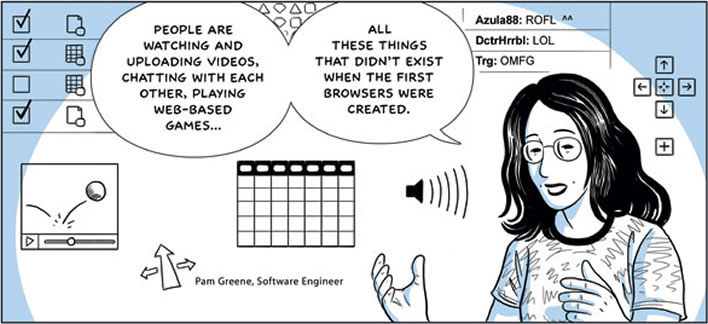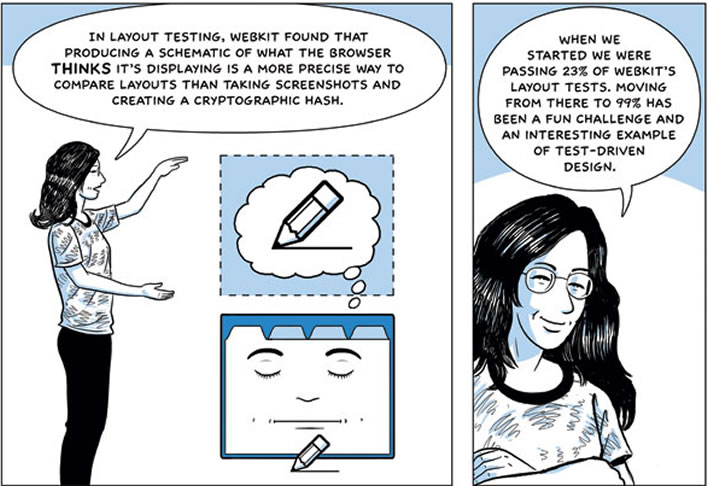Butch browsing
Richard Law, UTC 2020-08-14 10:43 Updated on UTC 2020-08-14
In September of 2008 Google released its own web browser, Google Chrome. Only four years later it became the most used web browser worldwide. It kept up the momentum: now it is the most used browser by far.
When it was launched all those years ago, the traditional, boring feature description was supplemented by a 39 page comic book showing caricatures of some members of the development team explaining the innards and USPs of the new browser for a rather geeky audience.
The tactic has worked well in the past for Google and others: enthuse the geeks and make them evangelists, leveraging their reputations to promote your product to the ignorant laity.
Twelve years is indeed a long time in our fast moving age. Your author's rheumy eyes needed to be rubbed more than once whilst reading this comic: all the developers featured were MEN – except, that is, for one woman, someone called Pam Greene, 'Software Engineer'. In a sign of early sensitivities, she made it onto the first page as well.

Image: ©Google.
But reality soon takes over: she appears on page ten, kneeling on the ground surrounded by the old-fashioned tools of the handyman. The only things missing for your author's rheumy eyes are the bucket and scrubbing brush.

Image: ©Google.
Her role, however, was not to clean the office but to manage the testing of the software. As anyone who has ever been a member of a software development team will know, the person running the testing, a.k.a 'no mates', is the most hated and shunned figure in the group.
Few normal humans, let alone the mimosa souls of software engineers, can bring themselves to like the person whose job it is to misunderstand their magnificent creations so comprehensively, to root out their errors so brutally, even – how can this be? – to pay attention to what those ignorant fools, users, experience. Everyone knows that all problems are really just user errors. Without users, there would be no bugs. QED.

Just run that past me again, would you? Image: ©Google.
Developers grudgingly accept the need for testers, just as they do the need for undertakers, traffic wardens or politicians – they would just rather not stand too near to any of them in the pub.
Since the geeky audience for the comic would consist mainly of men, Google seems to have got away with this dreadful misogyny. But… can it be? The most popular browser in the world was developed almost exclusively by MEN? Disgusting. They would never have cracked the ENIGMA machine! Boycott this browser immediately!
Update 14.08.2020
This jokey article should not be taken as a recommendation to use Google Chrome as your browser. Anyone who does not care about what is going on under the bonnet of Chrome and who is unconcerned about privacy and tracking can use Google Chrome and enjoy its many advanced features.
However, if you are concerned about these things, you should not use Google Chrome: it is a tracking and data collection tool with a browser attached. It uses a unique digital ID to track every internet search you make and potentially every website you visit.
Google is a retailer of advertising offering a search function as a data collection tool. The search results you are given are almost entirely dependent on someone paying Google to show them to you. Chrome skews that selection process even more.
The Chrome browser is not some great free gift to humanity, it is an instrument of data collection which is seamlessly integrated along with the search tool into Google's core business. Its digital ID allows the browser to be identified as a unique entity across all the websites visited. The level of penetration that Google has achieved for its data collection instrument is a marketing triumph.
This is not as evil as some paranoid people think: business is after all business – someone has got to pay for all these web goodies.
Let us say you order babyfood from one online retailer or search for suppliers of babyfood. When you now go to Amazon or Facebook and Co. you will probably be presented with lots of advertisements for babycare products. This behaviour will apply to your entire shopping list.
Your Chrome browser's ID will identify you across all social media, irrespective of your username. The information is not volatile either: the web never forgets. You can clear cookies and other data as often as you like but Chrome will always remember you. If you find this spooky then you should not use Google Chrome. This core tracking function cannot be switched off – it is in the nature of the beast.
The least invasive browser at the moment is Firefox (though the user has to take the trouble to switch some features off). Opera is not quite as bad as Chrome, but not far off. In sum: browser developers all need money to live; all browsers are a front for some monetisation scheme or other.
0 Comments UTC Loaded:
Input rules for comments: No HTML, no images. Comments can be nested to a depth of eight. Surround a long quotation with curly braces: {blockquote}. Well-formed URLs will be rendered as links automatically. Do not click on links unless you are confident that they are safe. You have been warned!